Charles E W Bean, Diaries, AWM38 3DRL 606/243A/1 - 1916 - 1934 - Part 25
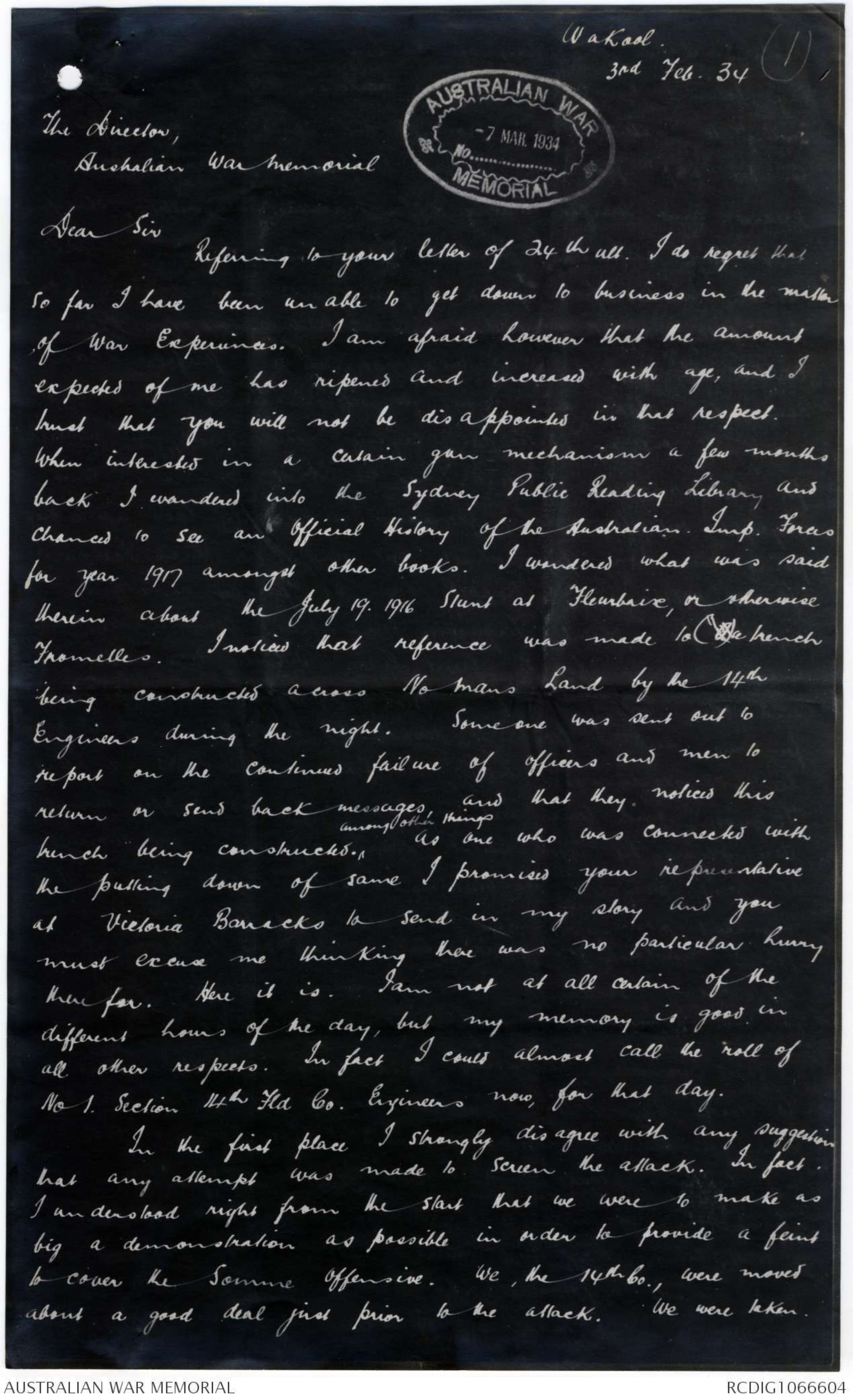
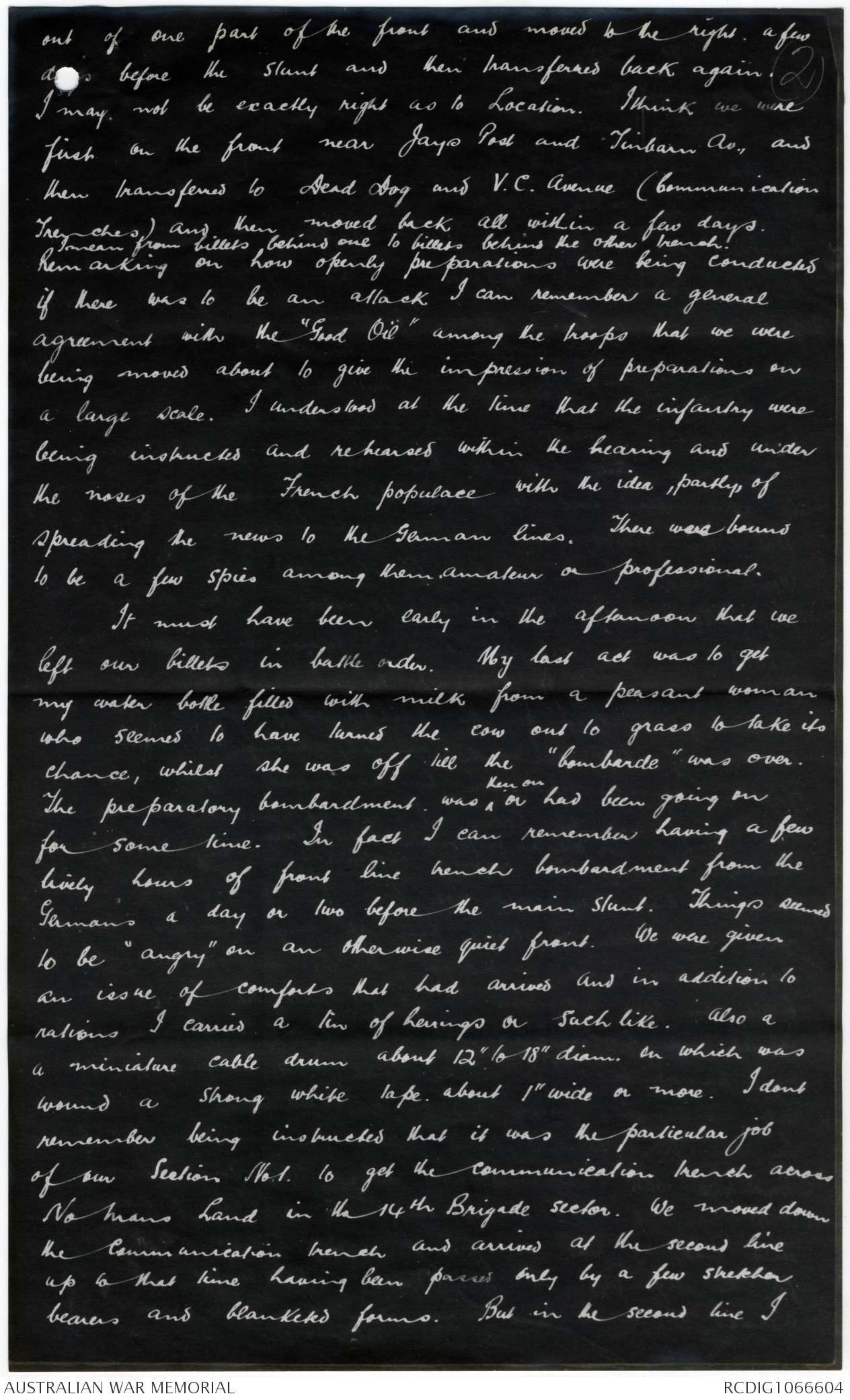
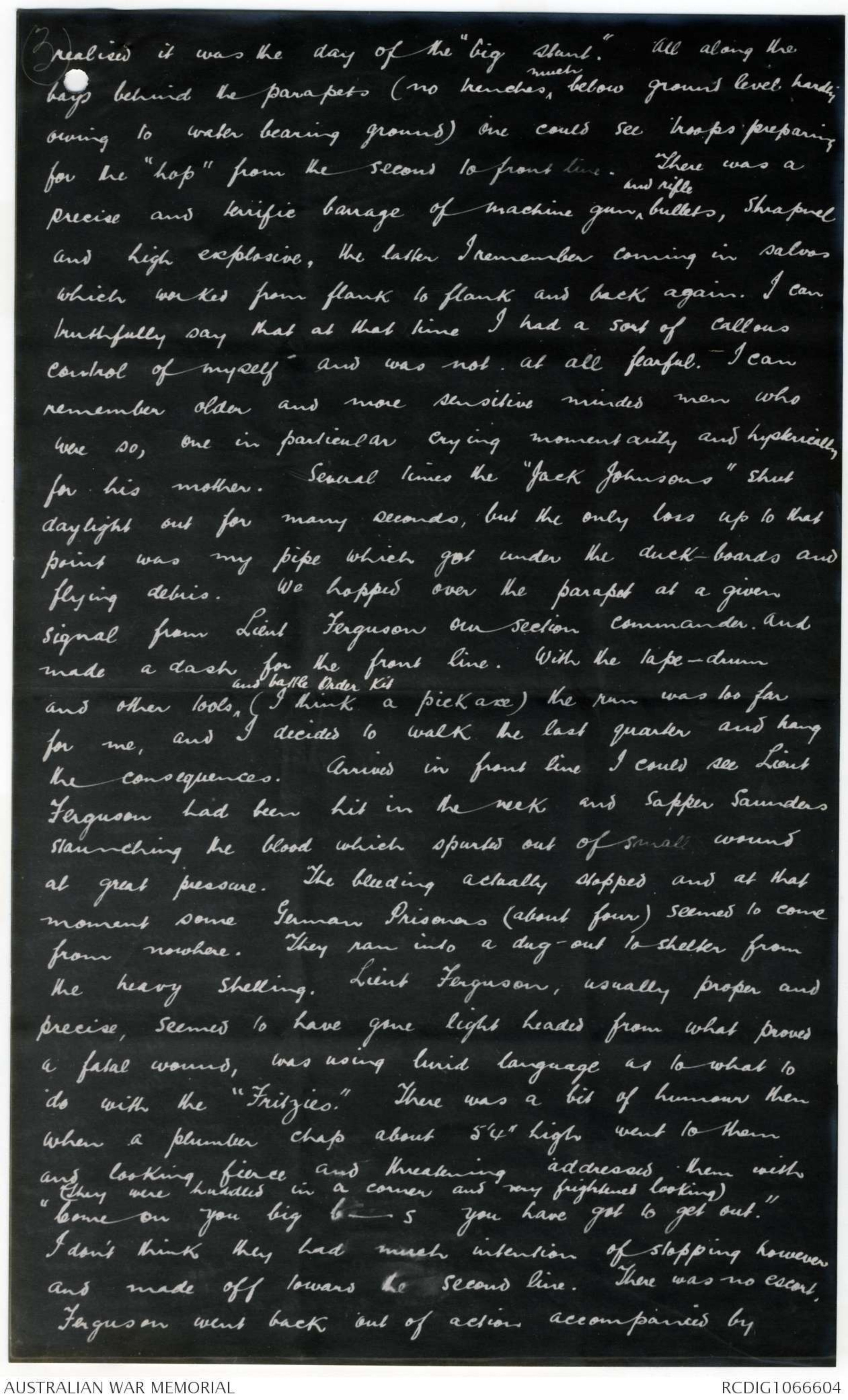
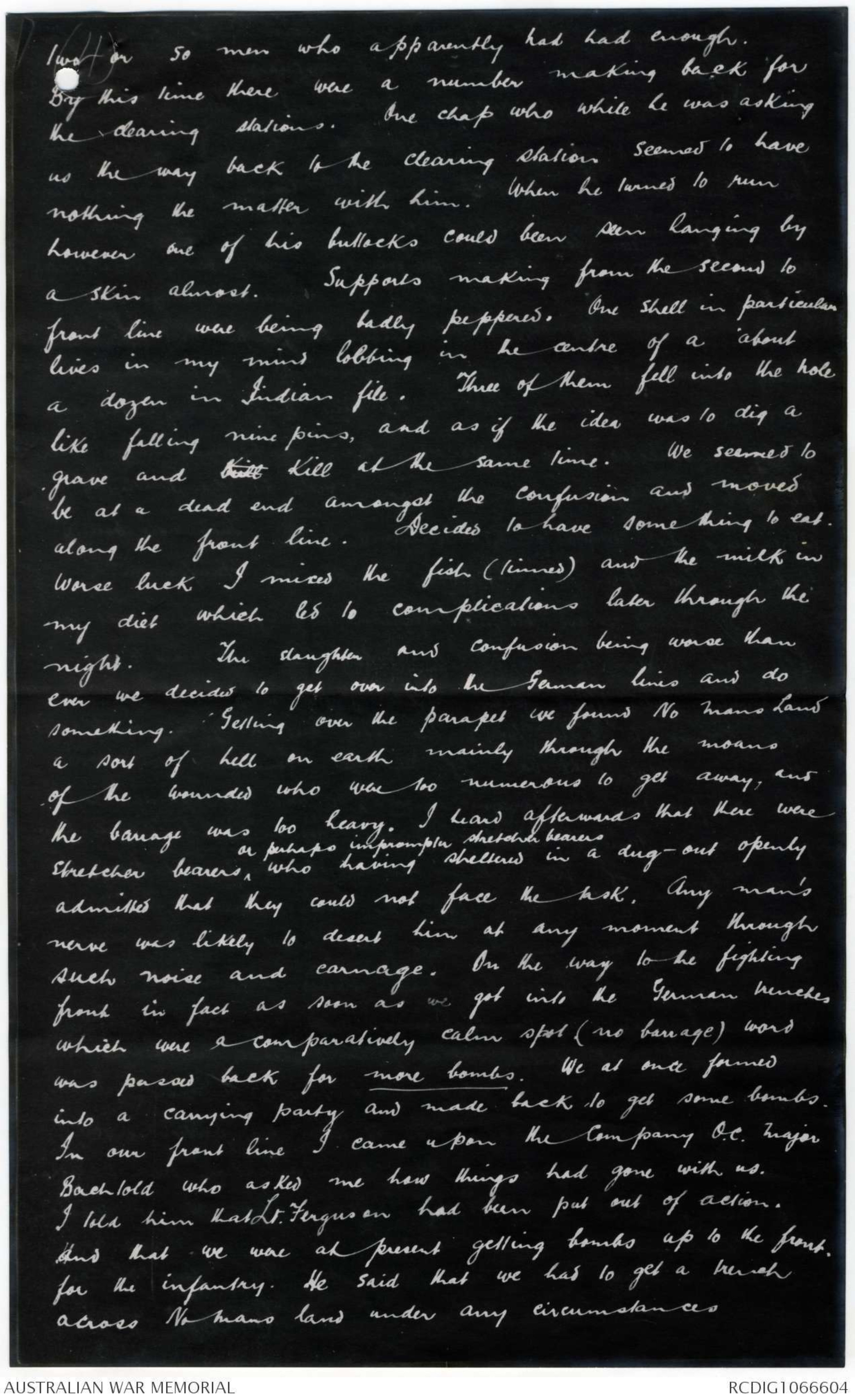
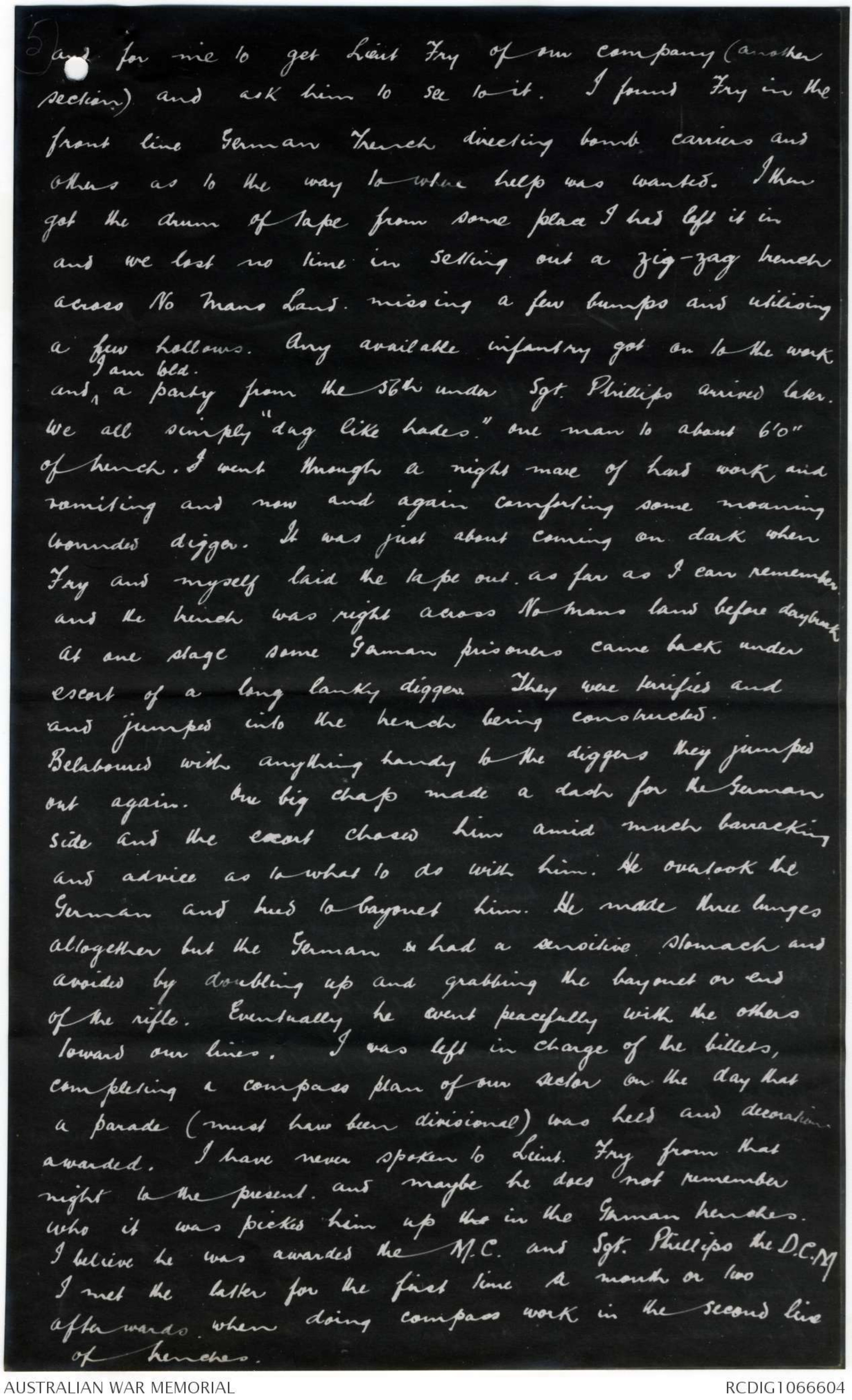
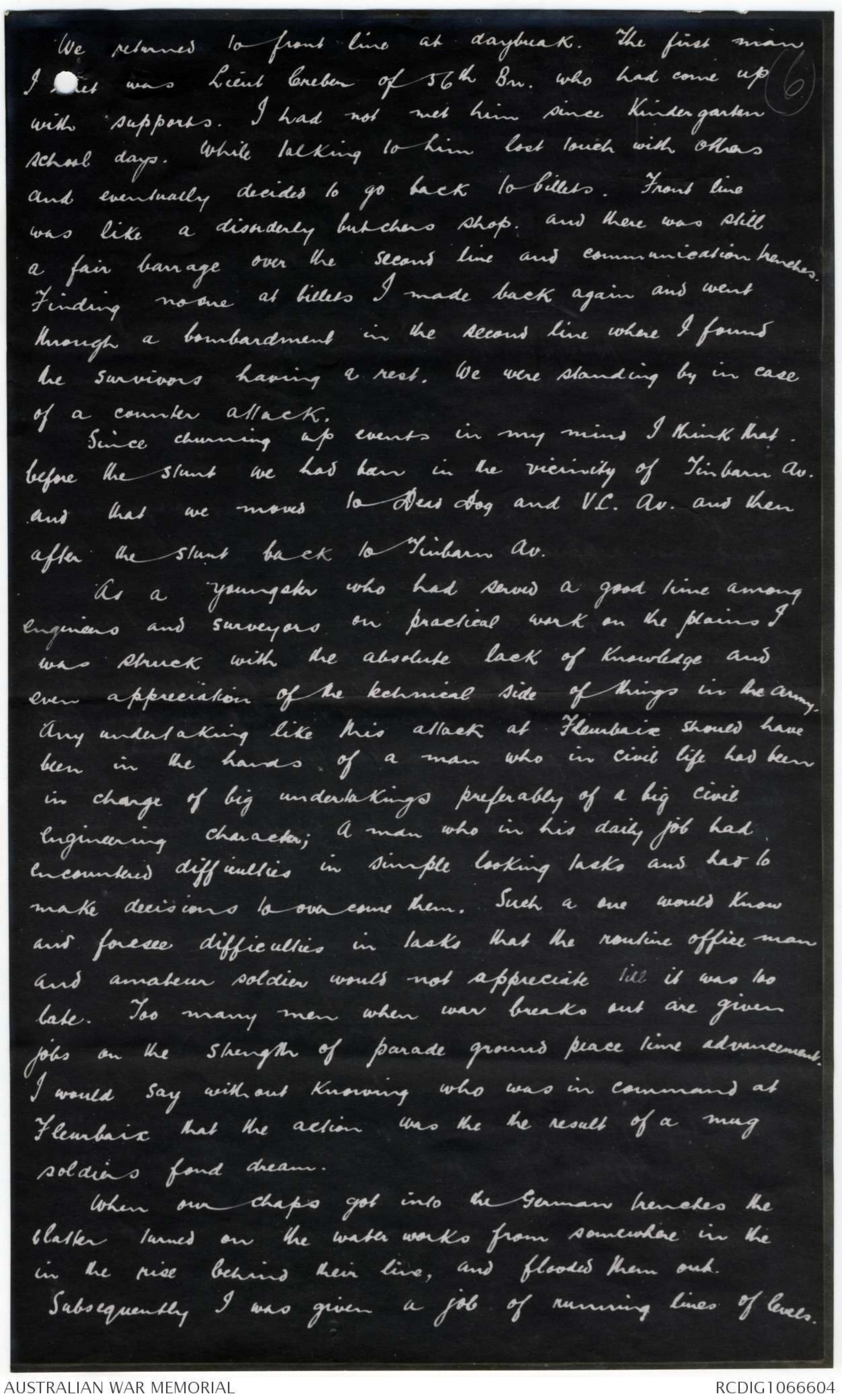
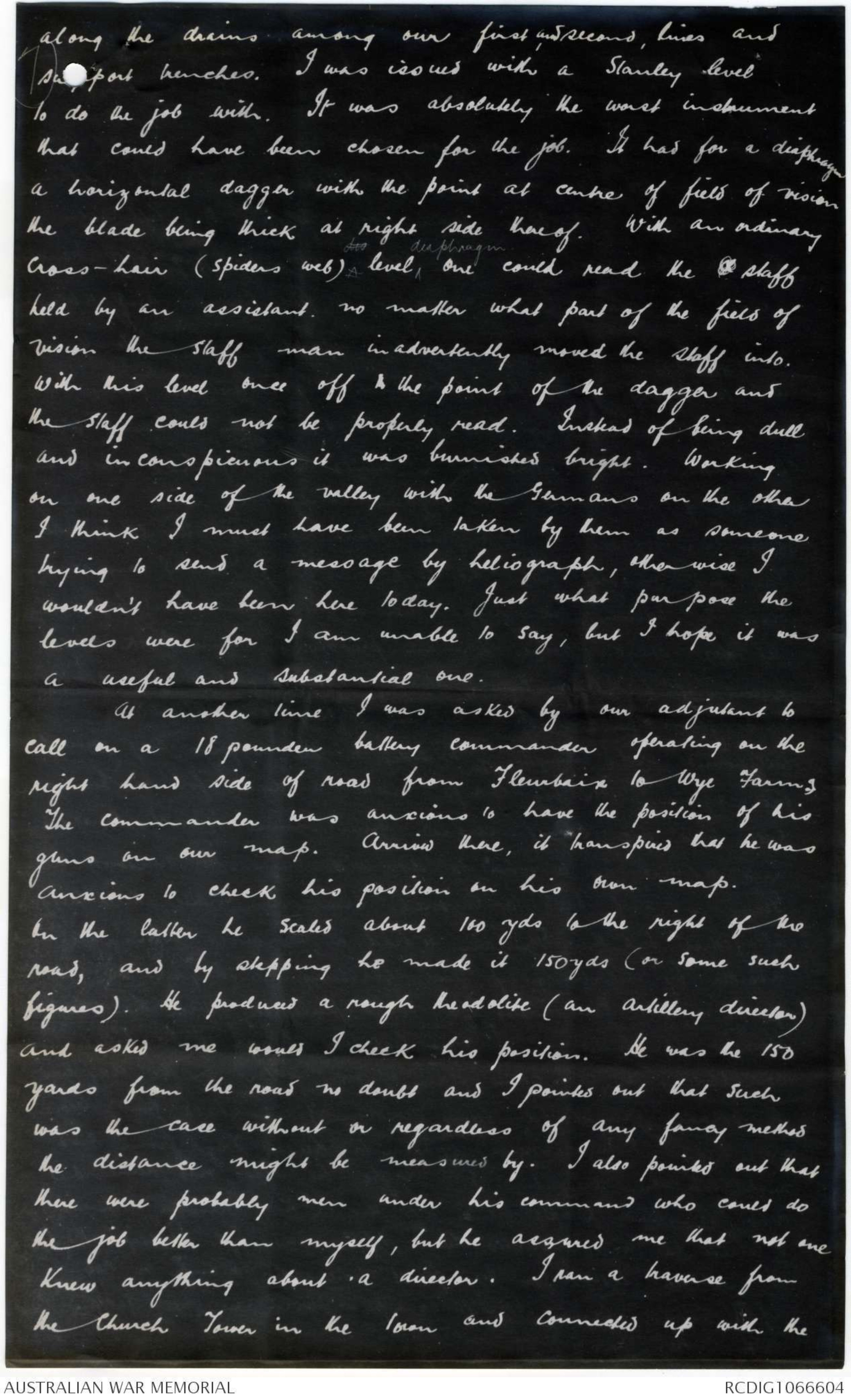
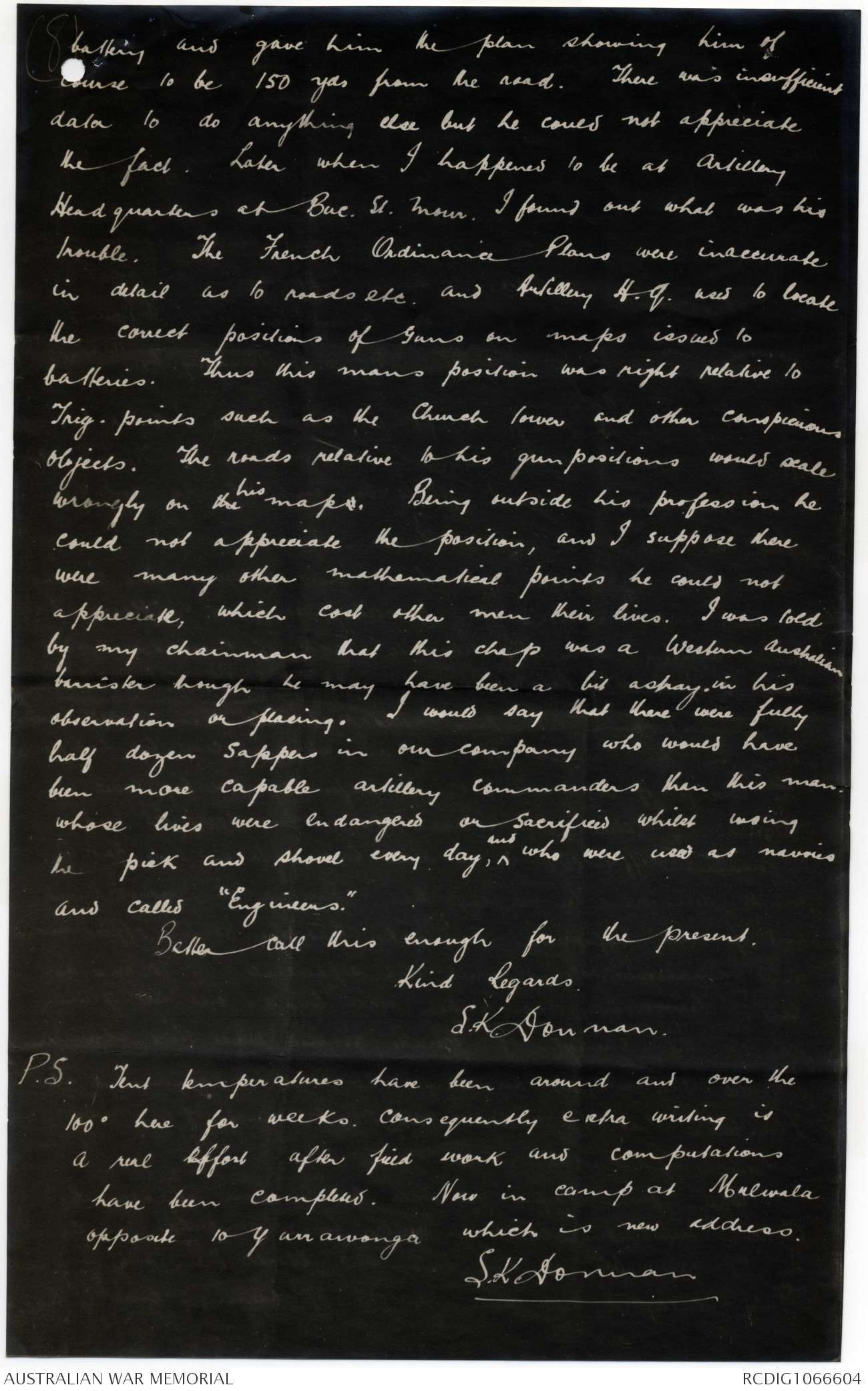
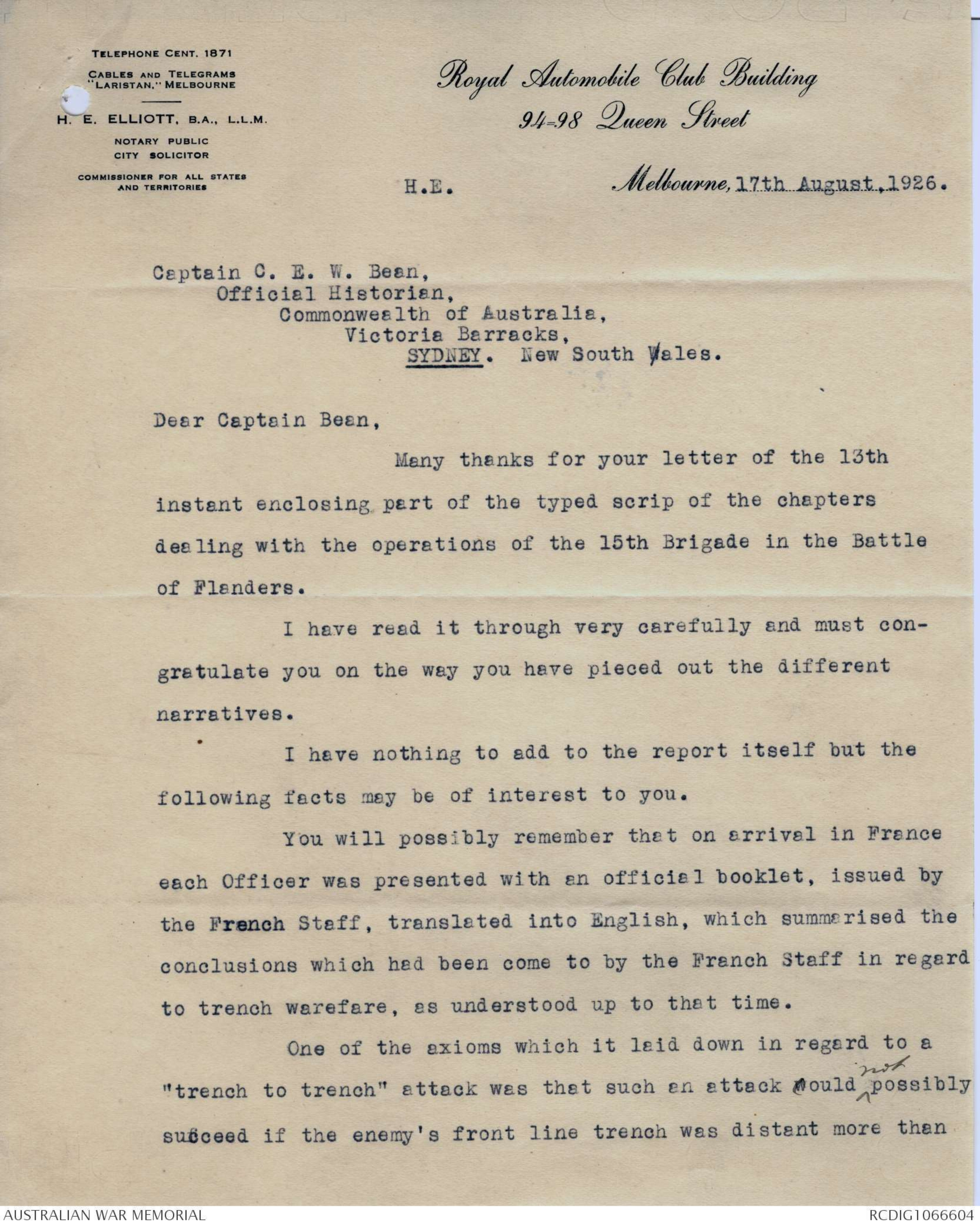
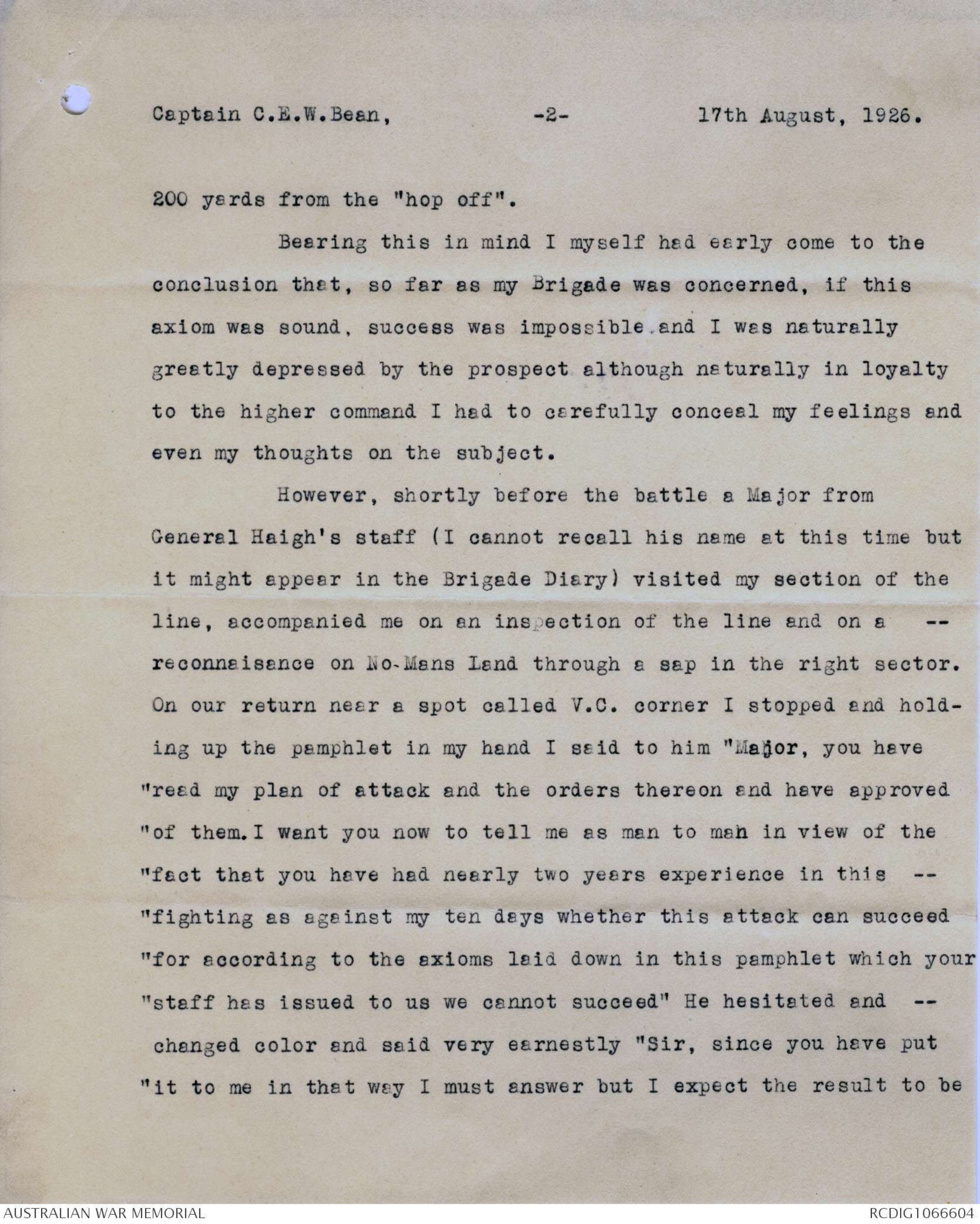
Wakool
3rd Feb. 34
1
[*AUSTRALIAN WAR
- 7 MAR 1934
MEMORIAL*]
The Director,
Australian War Memorial
Dear Sir,
Referring to your of 24th inst, I do regret that
so far I have been unable to get down to business in the matter
of War Experiences. I am afraid however that the amount
expected of me has ripened and increased with age, and I
trust that you will not be disappointed in this respect.
When interested in a certain gun mechanism a few months
back I wandered into the Sydney Public Reading Library and
chanced to see an Official History of the Australian Imp. Forces
for year 1917 amongst other books. I wondered what was said
therein about the July 19. 1916 stunt at Fleubaix, or otherwise
Fromelles. I noticed that reference was made to xxx a trench
being constructed across No Mans Land by the 14th
Engineers during the night. Someone was sent out to
report on the continued failure of officers and men to
return or send back messages, and that they noticed this
trench being constructed ^among other things. As one who was connected with
the pulling down of same I promised your representative
at Victoria Barracks to send in my story and you
must excuse me thinking there was no particular hurry
therefore. Here it is. I am not at all certain of the
different hours of the day, but my memory is good in
all other respects. In fact I could almost call the roll of
No 1 Section. 14th Fld Co. Engineers now, for that day.
In the first place I strongly disagree with any suggestion
that any attempt was made to screen the attack. In fact
I understood right from the start that we were to make as
big a demonstration as possible in order to provide a feint
to cover the Somme Offensive. We, the 14th Co., were moved
about a good deal just prior to the attack. We were taken
2
out of one part of the front and moved to the right a few
times, before the stunt and then transferred back again.
I may not be exactly right as to Location. I think we were
first on the front near Jays Post and Tinbarn Av., and
then transferred to Dead Dog and V.C. Avenue (Communication
Trenches) and then moved back all within a few days.
I mean from billets behind one to billets behind the other trench.
Remarking on how openly preparations were being conducted
if there was to be an attack I can remember a general
agreement with the "Good Oil" among the troops that we were
being moved about to give the impression of preparations on
a large scale. I understood at the time that the infantry were
being instructed and returned within the hearing and under
the noses of the French populace with the idea, partly of
spreading the news to the German lines. There were bound
to be a few spies among them, amateur or professional.
It must have been early in the afternoon that we
left our billets in battle order. My last act was to get
my water bottle filled with milk from a peasant woman
who seemed to have turned the cow out to grass to take its
chance, whilst she was off till the "bombarde" was over.
The preparatory bombardment was ^then on or had been going on
for some time. In fact I can remember having a few
lively hours of front line trench bombardment from the
Germans a day or two before the main Stunt. Things seemed
to be "angry" on an otherwise quiet front. We were given
an issue of comforts that had arrived and in addition to
rations I carried a tin of herrings or such like. Also a
a miniature cable drum about 12" to 18" diam. on which was
wound a strong white tape about 1" wide or more. I dont
remember being instructed that it was the particular job
of our Section No 1. to get the Communication trench across
No Mans Land in the 14th Brigade sector. We moved down
the Communication trench and arrived at the second line
up to that time having been passed only by a few stretcher
bearers and blanketed forms. But in the second line I
3
realised it was the day of the "big stunt". All along the
bays behind the parapets (no trenches ^much below ground level hardly
owing to water bearing ground) one could see heaps preparing
for the "hop" from the second to front line..... There was a
precise and terrific barrage of machine gun ^and rifle bullets, shrapnel
and high explosive, the latter I remember coming in salvos
which worked from flank to flank and back again. I can
truthfully say that at that time I had a sort of callous
control of myself and was not at all fearful. I can
remember also older and more sensitive minded men who
were so, one in particular crying momentarily and hysterically
for his mother. Several times the "Jack Jacksons" shut
daylight out for many seconds, but the only loss up to that
point was my pipe which got under the duck-boards and
flying debris. We hopped over the parapet at a given
signal from Lieut Ferguson our section Commander. and
made a dash for the front line. With the tape-down
and other tools, ^and battle order kit (I think a pick axe) the run was too far
for me, and I decided to walk the last quarter and hang
the consequences. Arrived in front line I could see Lieut
Ferguson had been hit in the neck and Sapper Saunders
staunching the blood which spurted out of small wound
at great pressure. The bleeding actually stopped and at that
moment some German Prisoners (about four) seemed to come
from nowhere. They ran into a dug-out to shelter from
the heavy shelling. Lieut Ferguson, usually proper and
precise, seemed to have gone light headed from what proved
a fatal wound, was using lurid language as to what to
do with the "Fritzies." There was a bit of humour then
when a plumber chap about 5'4" high went to them
and looking fierce and threatening addressed them with
(They were huddled in a corner and very frightened looking)
"Come on you big b........s you have got to get out"
I don't think they had much intention of stopping however
and made off towards the second line. There was no escort,
Ferguson went back out of action accompanied by
4
two or so men who apparently had had enough.
By this time there were a number making back for
the clearing stations. One chap who while he was asking
us the way back to the clearing station seemed to have
nothing the matter with him. When he turned to run
however one of his buttocks could been seen hanging by
a skin almost. Supports making from the second to
front line were being badly peppered. One shell in particular
lives in my mind lobbing in the centre of a about
a dozen in Indian file. Three of them fell into the hole
like falling nine pins, and as if the idea was to dig a
grave and died kill at the same time. We seemed to
be at a dead end amongst the confusion and moved
along the front line. Decided to have something to eat.
Worse luck I mixed the fish (tinned) and the milk in
my diet which led to complications later through the
night. The slaughter and confusion being worse than
ever we decided to get over into the German lines and do
something. Getting over the parapet we found No Mans Land
a sort of hell on earth mainly through the moans
of the wounded who were too numerous to get away, and
the barrage was too heavy. I heard afterwards that there were
stretcher bearers, ^or perhaps impromptu stretcher bearers who having sheltered in a dug-out openly
admitted that they could not face the task. Any man's
nerve was likely to desert him at any moment through
such noise and carnage. On the way to the fighting
front in fact as soon as we go into the German trenches
which were a comparatively calm spot (no barrage) word
was passed back for more bombs. We at once formed
into a carrying party and made back to get some bombs
In our front line I came upon the Company O.C. Major
Bachlold who asked me how things had gone with us.
I told him that Lt. Ferguson had been put out of action.
And that we were at present getting bombs up to the front
for the infantry. He said that we had to get a trench
across No Mans Land under any circumstances
5
and for me to get Lieut Fry of my Company (another
section) and ask him to see to it. I found Fry in the
front line German Trench directing bomb carriers and
others as to the way to where help was wanted. I then
got the drum of tape from some place I had left it in
and we lost no time in setting out a zig-zag trench
across No Mans Land missing a few bumps and utilising
a few hollows. Any available infantry got on to the work
and ^am told a party from the 56th under Sgt Phillips arrived later.
We all simply "dug like hades". One man to about 6' 0"
of trench. I went through a nightmare of hard work and
vomiting and now and again comforting some moaning
wounded digger. It was just about coming on dark when
Fry and myself laid the tape out, as far as I can remember
and the trench was right across No Mans Land before daybreak.
At one stage some German prisoners came back under
escort of a long lanky digger. They were terrified and
and jumped into the trench being constructed.
Belaboured with anything handy to the diggers they jumped
out again. One big chap made a dash for the German
side and the escort chased him amid much barracking
and advice as to what do with him. He overtook the
German and had to bayonet him. He made three lunges
altogether but the German x had a sensitive stomach and
avoided by doubling up and grabbing the bayonet on end
of the rifle. Eventually he went peacefully with the others
toward our lines. I was left in charge of the billets,
completing a compass plan of our sector on the day that
a parade (must have been divisional) was held and decorations
awarded. I have never spoken to Lieut Fry from that
night to the present, and maybe he does not remember
who it was picked him up xxx in the German trenches.
I believe he was awarded the M.C. and Sgt Phillips the D.C.M
I met the latter for the first time a month or two
afterwards when doing compass work in the second line
of trenches.
6
We returned to front line at daybreak. The first man
I met was Lieut Creben of 56th Bn. who had come up
with supports. I had not met him since Kindergarten
school days. While talking to him lost touch with others
and eventually decided to go back to billets. Front line
was like a disorderly butchers shop. and there was still
a fair barrage over the second line and communication trenches.
Finding no one at billets I made back again and went
through a bombardment in the second line where I found
the survivors having a rest. We were standing by in case
of a counter attack.
Since churning up events in my mind I think that
before the stunt we had been in the vicinity of Tinbarn Av
and had we moved to Dead dog and V.C. Av. and then
after the stunt back to Tinbarn Av.
As a youngster who had served a good time among
engineers and surveyors on practical work on the plains I
was struck with the absolute lack of knowledge and
even appreciation of the technical side of things in the army.
Any undertaking like this attack at Fleubaix should have
been in the hands of a man who in civil life had been
in charge of big undertakings preferably of a big civil
engineering character; A man who in his daily job had
encountered difficulties in simple looking tasks and had to
make decisions to overcome them. Such a one would know
and foresee difficulties in tasks that the routine office man
and amateur soldier would not appreciate till it was too
late. Too many men when war breaks out are given
jobs on the strength of parade ground peace time advancement.
I would say without knowing who was in command at
Fleubaix that the action was the result of a mug
soldiers fond dream.
When our chaps got into the German trenches the
latter turned on the water works from somewhere in the
in the rise behind their line, and flooded them out.
Subsequently I was given a job of running lines of levels.
7
along the drains among our first and second lines and
support trenches. I was issued with a Stanley level
to do the job with. It was absolutely the worst instrument
that could have been chosen for the job. It had a diaphragm
a horizontal dagger with the point at centre of field of vision
The blade being thick at right side thereof. With an ordinary
cross-hair (spiders web)^dia level ^diaphragm one could read the x staff
held by an assistant no matter what part of the field of
vision. The staff man inadvertently moved the Staff into.
With this level once off the point of the dagger and
the staff could not be properly read. Instead of being dull
and inconspicuous it was burnished bright. Working
on one side of the valley with the Germans on the other
I think I must have been taken by them as someone
trying to send a message by heliograph, otherwise I
wouldn't have been here today. Just what purpose the
levels were for I am unable to say, but I hope it was
a useful and substantial one.
At another time I was asked by an adjutant to
call on a 18 pounder battery commander operating on the
right hand side of road from Fleubaix to Wye Farm.
The Commander was anxious to have the position of his
guns on our map. Arrived there, it transpired that he was
anxious to check his position on his own map.
In the latter he scaled about 100 yds to the right of the
road, and by skipping he made it 150 yds (or some such
figures). He produced a rough theodolite (an artillery director)
and asked me would I check his position. He was the 150
yards from the road no doubt and I pointed out that such
was the case without or regardless of any fancy method
the distance might be measured by. I also pointed out that
there were probably men under his command who could do
the job better than myself, but he assured me that not one
new anything about 'a director'. I ran a traverse from
the Church Tower in the town and connected up with the
8
balking and gave him the plan showing him of
course to be 150 yds from the road. There was insufficient
data to do anything else but he could not appreciate
the fact. Later when I happened to be at Artillery
Headquarters at Bue. St. Mour I found out what was his
trouble. The French Ordinance Plans were inaccurate
in detail as to roads etc. and Artillery H.Q. used to locate
the correct positions of guns on maps issued to
Watkins. Thus this mans position was right relative to
Trig-points such as the Church Tower and other conspicuous
objects. The roads relative to his gun positions would scale
wrongly on the his maps. Being outside of his profession he
could not appreciate the position, and I suppose there
were many other mathematical points he could not
appreciate, which cost other men their lives. I was told
by my chairman that this chap was a Western Australian
barrister though he may have been a bit astray in his
observation on placing. I would say that there were fully
half dozen sappers in our company who would have
been more capable artillery commanders than this man
whose lives were endangered or sacrificed whilst using
the pick and shovel every day ^and who were used as navies
and called "Engineers".
Better call this enough for the present.
Kind Regards
S.K. Donman.
P.S. Tent temperatures have been around and over the
100o here for weeks. Consequently extra writing is
a real effort after field work and computations
have been completed. Now in camp at Mulwala
opposite to Yarrawonga which is new address.
S.K. Donman
TELEPHONE CENT. 1871
CABLES AND TELEGRAMS
"LARISTAN,"MELBOURNE
Royal Automobile Club Building
94-98 Queen Street
Melbourne, 17th August, 1926
H. E. ELLIOTT, B.A, L.L.M.
NOTARY PUBLIC
CITY SOLICITOR
COMMISSIONER FOR ALL STATES
AND TERRITORIES
H.E.
Captain C. E. W. Bean,
Official Historian
Commonwealth of Australia,
Victoria Barracks
SYDNEY. New South Wales.
Dear Captain Bean,
Many thanks for your letter of the 13th
instant enclosing part of the typed scrip of the chapters
dealing with the operations of the 15th Brigade in the Battle
of Flanders.
I have read it through very carefully and must congratulate
you on the way you have pieced out the different
narratives.
I have nothing to add to the report itself but the
following facts may be of interest to you.
You will possibly remember that on arrival in France
each Officer was presented with an official booklet, issued by
the French Staff, translated into English, which summarised the
conclusions which had been come to by the French Staff in regard
to trench warfare, as understood up to that time.
One of the axioms which it laid down in regard to a
"trench to trench" attack was that such an attack could ^not possibly
succeed if the enemy’s front line trench was distant more than
-2-
Captain C.E.W. Bean,
17th August, 1926.
200 yards from the "hop off".
Bearing this in mind I myself had early come to the
conclusion that, so far as my Brigade was concerned, if this
axiom was sound, success was impossible, and I was naturally
greatly depressed by the prospect although naturally in loyalty
to the higher command I had to carefully conceal my feelings and
even my thoughts on the subject.
However, shortly before the battle a Major from
General Haigh'’s staff (I cannot recall his name at this time but
it might appear in the Brigade Diary) visited my section of the
line, accompanied me on an inspection of the line and on a --
reconnaisance on No-Mans Land through a sap in the right sector.
On our return near a spot called V.C. corner I stopped and holding
up the pamphlet in my hand I said to him "Major, you have
"read my plan of attack and the orders thereon and have approved
"of them. I want you now to tell me as man to man in view of the
"fact that you have had nearly two years experience in this --
"fighting as against my ten days whether this attack can succeed
"for according to the axioms laid down in this pamphlet which your
"staff has issued to us we cannot succeed" He hesitated and --
changed color and said very earnestly "Sir, since you have put
"it to me in that way I must answer but I expect the result to be
 Deb Parkinson
Deb ParkinsonThis transcription item is now locked to you for editing. To release the lock either Save your changes or Cancel.
This lock will be automatically released after 60 minutes of inactivity.